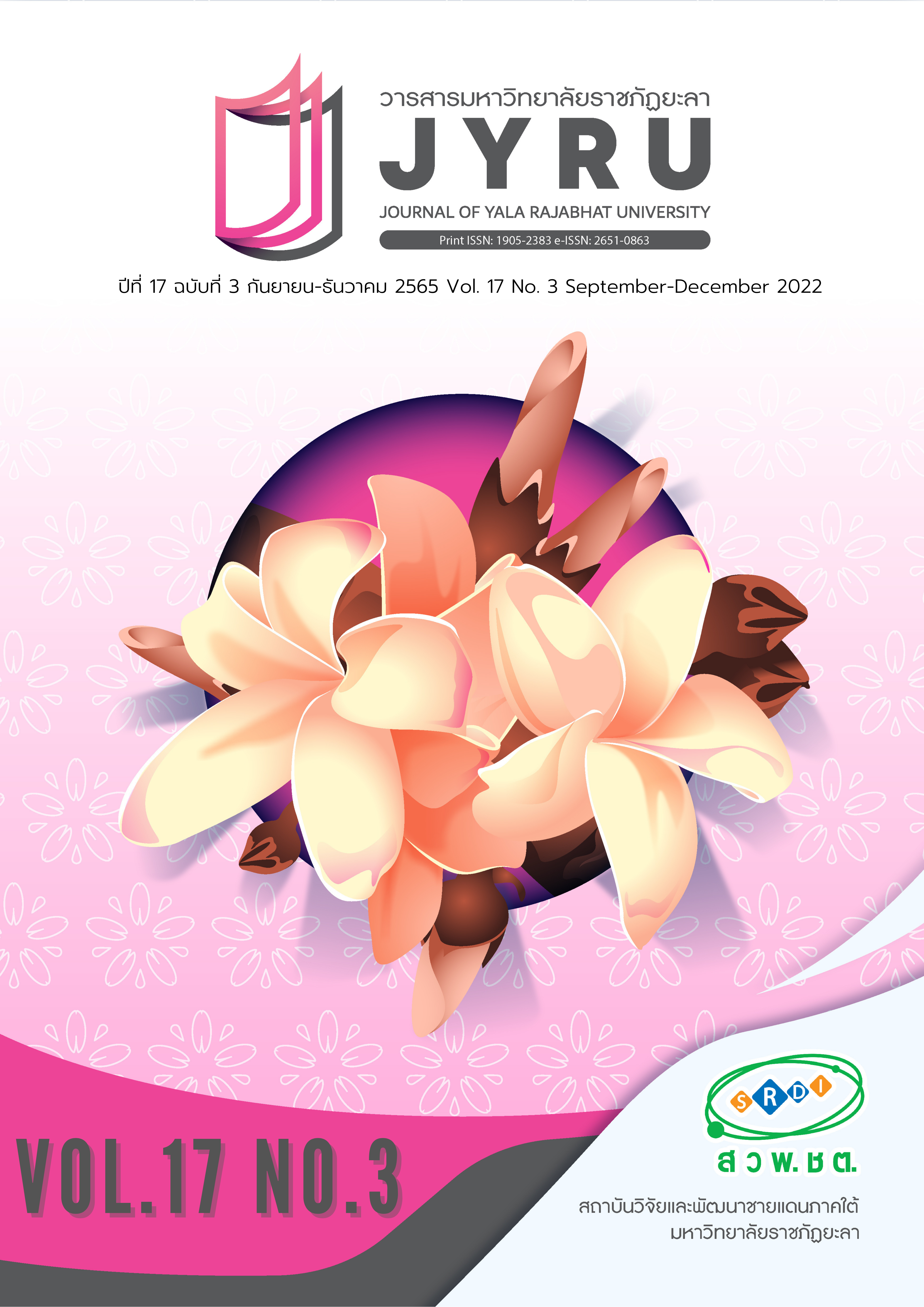ผลการใช้ชุดกิจกรรมการจัดการเรียนรู้เพื่อพัฒนาจริยธรรมอิสลามสำหรับนักเรียนโรงเรียนเอกชนสอนศาสนาอิสลามในสามจังหวัดชายแดนภาคใต้
Main Article Content
บทคัดย่อ
การวิจัยนี้มีวัตถุประสงค์เพื่อสร้างและหาประสิทธิภาพของชุดกิจกรรมการจัดการเรียนรู้เพื่อพัฒนาจริยธรรมอิสลาม และเพื่อประเมินและเปรียบเทียบความรู้ความเข้าใจ รวมทั้งพฤติกรรมด้านจริยธรรมอิสลามของนักเรียนก่อนและหลังการจัดการเรียนรู้โดยใช้ชุดกิจกรรม กลุ่มตัวอย่าง คือ นักเรียนชั้นมัธยมศึกษาปีที่ 1 โรงเรียนเอกชนสอนศาสนาอิสลามในสามจังหวัดชายแดนภาคใต้ จำนวน 100 คน ได้มาโดยการเลือกแบบเจาะจงจากนักเรียนชั้นมัธยมศึกษาปีที่ 1 ในโรงเรียนที่มีความพร้อมและสมัครเข้าร่วมกิจกรรมตามเงื่อนไขของโครงการ คือ ผู้บริหาร ครูที่ปรึกษาและผู้ปกครองยินยอมให้นักเรียนเข้าร่วมโครงการ แล้วใช้การสุ่มอย่างง่ายโดยเขียนชื่อโรงเรียนในฉลาก สำหรับรับการสุ่มมาจังหวัดละ 2 โรงเรียน เครื่องมือที่ใช้ในการวิจัย ประกอบด้วย 1) ชุดกิจกรรมการจัดการเรียนรู้เพื่อพัฒนาจริยธรรมอิสลาม จำนวน 5 ชุด 2) แบบทดสอบวัดความรู้ความเข้าใจด้านจริยธรรมอิสลาม และ 3) แบบประเมินพฤติกรรมด้านจริยธรรมอิสลาม วิเคราะห์ข้อมูลด้วยค่าร้อยละ ค่าเฉลี่ย ส่วนเบี่ยงเบนมาตรฐาน และการทดสอบทีแบบรายคู่ ผลการวิจัยพบว่าชุดกิจกรรมการจัดการเรียนรู้เพื่อพัฒนาจริยธรรมอิสลามที่พัฒนาขึ้นมีทั้งหมด 5 กิจกรรมโดยผู้เชี่ยวชาญเห็นว่ามีความเหมาะสมในระดับมาก และมีประสิทธิภาพเท่ากับ 80.65/81.43 ซึ่งเป็นไปตามเกณฑ์ที่กำหนด ส่วนความรู้ความเข้าใจและพฤติกรรมด้านจริยธรรมอิสลามของนักเรียนที่เรียนจากชุดกิจกรรมการจัดการเรียนรู้ หลังเรียนสูงกว่าก่อนเรียนอย่างมีนัยสำคัญทางสถิติที่ระดับ .01
Article Details

อนุญาตภายใต้เงื่อนไข Creative Commons Attribution-NonCommercial-NoDerivatives 4.0 International License.
บทความ ข้อมูล เนื้อหา รูปภาพ ฯลฯ ที่ได้รับการเผยแพร่ในวารสารมหาวิทยาลัยราชภัฏยะลานี้ ถือเป็นลิขสิทธิ์ของวารสารมหาวิทยาลัยราชภัฏยะลา หากบุคคลหรือหน่วยงานใดต้องการนำทั้งหมดหรือส่วนหนึ่งส่วนใดไปเผยแพร่ต่อหรือกระทำการใดๆ จะต้องได้รับอนุญาตเป็นลายลักษณ์อักษรจากวารสารมหาวิทยาลัยราชภัฏยะลาก่อนเท่านั้น
เอกสารอ้างอิง
Banjong, F. (2008). The multicultural education knowledge in 3 Southern border provinces: Trend for the educational reformation. Journal of Education Faculty of Education, Prince of Songkhla University, Pattani campus. 19(1), (1-14) (in Thai).
Chaivijarn, S. (2010). Muslim way of life and education management in the community: a case study of Islamic education center of Najmuddeen mosque (TADIKA) Tambon Saikao, Amphoe Kokpho, Changwat Pattani. Master’s Thesis. Prince of Songkhla University. (in Thai).
Kattiya, S & Suwajittanon, W. (2011). Research patterns and statistics. Bangkok: Chulalungkorn University (in Thai).
Khemmani, T. (2014). Science of teaching pedagogy. (18th ed.). Bangkok: Chulalungkorn University (in Thai).
Lamjai, P. (2014). Moral development model of secondary school students. Journal of the Humanities and Social Sciences University of Phayao, 2(2), 46-58. (in Thai).
Lansa, S., & Vanichwatanavorachai, S. (2017). The development of learning activity package using inquiry process for promoting critical thinking and scientific mind for fourth grade students. Veridian E-Journal, Silpakorn University, 9(2), 1337. (in Thai).
Moonkham. S. & Moonkham. (2002). 20 Methods of learning management: to develop morals and ethics. Bangkok: Printing Press. (in Thai).
Muhamadruslee, D. (2012). Moral life accordance with Islamic teachings of Islamic religious school’s students in Pattani province. Al-Nur Journal of Graduate School, Fatoni University. 7(12), 69-86 (in Thai).
Niloh, W. (2019). Islamic work ethics: a systematic literature review. Journal of Islamic Studies, Prince of Songkhla University. Pattani Campus. 8(1), 1-17 (in Thai).
Parichart. (2017). The construction of learning activity developed morals and ethics for honesty of university students in the eastern region of Thailand by employing teaching and learning strategies based on constructionism theory. Journal of Southern Technology, 10(1), 143-150 (in Thai).
Puangpaiboon, K. (2013). Effects of home-Room activities on development of moral and knowledge of prathomsuksa four students, Chulalongkorn University Demonstration Elementary School. Journal of Education. Chulalongkorn University, 41(4), 55-68 (in Thai).
Rapeepan, M. (2013). Islam and sustainable development: A case study of Masjid Kamalulislam community, Khlong Saen Saep, Bangkok. (Master of Science (Environment Management)). Bangkok: NIDA. (in Thai).
Rewadee, S. (2019). Application of co-operative learning theory in teaching and learning design. Journal of Boromarjonani College of Nursing Suphanburi, 2(1), (5-16) (in Thai).
Supachai & Prapas. (2021). The affecting of learning management based on Thorndike's concepts toward audiovisual skills in international music courses for students for Mattayomsuksa One Students. In proceeding of the 12th Hatyai National and International Conference, June 25th (in Thai).
Teerawatanachat, N. & Srisaenyong, S. (2014). Research on the construction of learning package to develop the ethics of matthayomsuksa 4 students on good citizenship topic by using constructivism theory. Journal of Education and Social Development, 10(1), 35-45 (in Thai).
Toh Thuan, M. (2011). States, problems and inculcation of akhlaq into Islamic private schools. Master’s Thesis. Prince of Songkla University, Pattani (in Thai).
Tomorn, S. (2017). When Islam is the fastest growing religion. Retrieved 26 December 2021, from: https://www.the101.world/muslim-and-ageing-society
Wiangwalai, S. (2013). Learning management. Bangkok: O.S. Printing House. (in Thai).
Yuttana. (2017). Problems of academic affairs administration of Islamic private schools in southern border provinces. Al-Nur Journal of Graduate School, Fatoni University. 7(12), 69-86. (in Thai).


